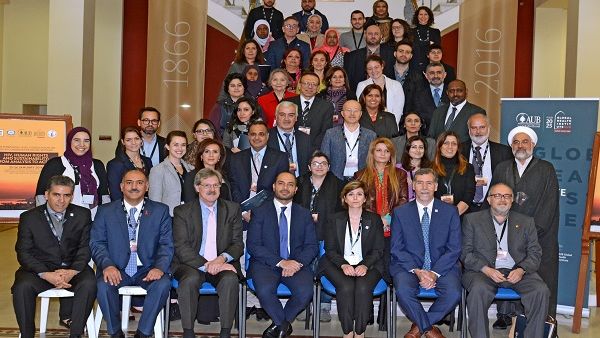AUB's Global Health Institute Hosts Third High-Level Consultation on HIV

The Global Health Institute (GHI) at the American University of Beirut (AUB) hosted “The Third High-Level Consultation on HIV in Conservative Social Settings”. The two days high-level meeting, held on 25-26 January 2018, was co-organized with the International AIDS Society (IAS) and the Global Institute for Health and Human Rights (GIHHR) at the State University of New York (SUNY) at Albany.
Both organizations are global leaders in the fight against HIV/AID with the International AIDS Society (IAS) leading collective action on every front of the global HIV response through its membership base, scientific authority, and convening power. The Global Institute for Health and Human Rights (GIHHR) is an academic unity aiming to advance the understanding and protection of health and human rights in a theoretical, academic, practical, and ethical context.
The meeting comprised a series of keynote presentations, panel discussions, and working groups led by global experts on HIV including key HIV service providers, community advocates and policy makers.
Experts were provided a platform to discuss the topic of HIV from cultural, social, religious and governmental perspectives with an emphasis on conservative settings and vulnerable populations including refugees. More than 60 attendees of different professional backgrounds participated in this closed experts meeting representing various sectors including health ministries, non-governmental organizations, educational organizations, religious institutions, and funding agencies. Discussions on how to build sustainable health systems and supportive communities for people living with HIV (PLWH) in conservative settings were highly contextualized through the experience and expertise of participants from low and middle-income countries (LMICs) including Somalia, Afghanistan, Egypt, Tajikistan, Tunisia, Kazakhstan, Iran, Morocco, Algeria, and Nigeria, among others.
“The intersection of HIV and human rights is of great relevance to many regions of the World, including the Arab Region. The challenge of a sustainable response to HIV is paramount given limited resources, and not necessarily only financial” said Dr. Shadi Saleh, Founding Director of the AUB Global Health institute. He added “I am confident that the global health community would be very interested in the proceedings from this high-level meeting given the cadre of international HIV/AIDS experts participating”.
Dr. Arash and Dr. Kamiar Alaei, co-founders of the Global Health Institute for Health and Human Rights at The State University of New York at Albany, stated that “Discussions about HIV/AIDS should go beyond merely medical ones to involve human rights, access to services, and social support for the PLWH, equity, and equality”. They added, “We are honored to have the Global Health Institute at the American University of Beirut as our partner in this meeting and we envision stressing on the leading role GHI plays as a regional convening space for global HIV experts”.
Many IAS staff members were present in the meeting and took part in the deliberations. “IAS is really excited about the collaborative efforts that have been invested in this high-level meeting that is crucial to set the top priority areas to be discussed during the 22nd International AIDS Conference that will be held in Amsterdam this coming July 2018” said Kevin Osborne, Director of HIV Advocacy and Programs at the International AIDS Society (IAS) in Geneva. “The meeting is a key milestone to showcase some of the issues worth addressing such as the human rights, societal, cultural, and religious aspects of the discussions about HIV/AIDS”.
The meeting was concluded by an action plan to be presented at the 22nd International AIDS Conference, Amsterdam, Netherlands on 23-27 July 2018.
Background Information
American University of Beirut
Founded in 1866, the American University of Beirut is a teaching-centered research university based on the American liberal arts model of higher education. AUB has over 9,000 students and over 1,200 instructional faculty members. The University encourages freedom of thought and expression and seeks to graduate men and women committed to creative and critical thinking, lifelong learning, personal integrity, civic responsibility, and leadership.






